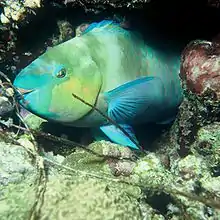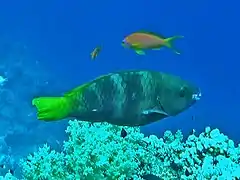Rusty parrotfish
The rusty parrotfish (Scarus ferrugineus) is a species of marine ray-finned fish, a parrotfish belonging to the family Scaridae. It is associated with reefs in the north western Indian Ocean and the Red Sea.
| Rusty parrotfish | |
|---|---|
 | |
| Terminal phase | |
| Scientific classification | |
| Kingdom: | Animalia |
| Phylum: | Chordata |
| Class: | Actinopterygii |
| Order: | Labriformes |
| Family: | Scaridae |
| Genus: | Scarus |
| Species: | S. ferrugineus |
| Binomial name | |
| Scarus ferrugineus Forsskål, 1775 | |
| Synonyms[2] | |
|
List
| |
Distribution and habitat
This reef-associated species can be found on coral reefs at a depth of 1 – 60 m in the Red Sea, the Gulf of Aden, and the Persian Gulf where it is found off the coastst of Bahrain, Djibouti, Egypt, Eritrea, Yemen, Israel, Jordania, Iran, Qatar, United Arab Emirates, Oman, Saudi Arabia, Somalia and Sudan), as well as off Socotra. [1] It is generally common. [2]
Description

Scarus ferrugineus measures up to 41 cm (16 in) in length.[2] Two colour patterns may be distinguished. [3] While the terminal phase is multicoloured, bright in colour, mostly blue-green, the initial phase, in which frequently these fishes are seen in groups, is brownish (hence the common name) with light and dark bands and a yellow tail.[3]
Biology
These fishes can be seen from March to November.[4] They are oviparous and protogynous hermaphrodites.
Three life phases can be distinguished, the juveniles, the adults of the initial phase (mostly females), and the adult males on the terminal phase (derived from females through sex and colour change). [3]
Individuals in the terminal phase form harems. They feed mainly on benthic algae. [2][5]
Naming
The rusty parrotfish was first formnally described as Scarus ferrugineus in 1775 by the Swedish naturalist, explorer and orientalist Peter Forsskål (1732–1763) with the type locality given as Dahab on the northwestern coast of the Gulf of Aqaba off the Sinai Peninsula in Egypt.[6]
Human use
The rusty parrotfish is a quarry species for artisanal fisheries within its range.[1]
References
- Myers, R.; Choat, J.H.; Russell, B.; et al. (2012). "Scarus ferrugineus". IUCN Red List of Threatened Species. 2012: e.T190759A17778209. doi:10.2305/IUCN.UK.2012.RLTS.T190759A17778209.en. Retrieved 12 February 2020.
- Froese, Rainer and Pauly, Daniel, eds. (2019). "Scarus ferugineus" in FishBase. December 2019 version.
- El-Sayed Ali, T.; Osman, A. M.; Abdel-Aziz, S. H.; Bawazeer, F. A. (2011). "Growth and longevity of the protogynous parrotfish, Hipposcarus harid, Scarus ferrugineus and Chlorurus sordidus (Teleostei, Scaridae), off the eastern coast of the Red Sea". Journal of Applied Ichthyology. 27 (3): 840–846. doi:10.1111/j.1439-0426.2010.01566.x.
- Scarus ferrugineus. iNaturalist
- Afeworki, Y.; Zekeria, ZA; Videler, JJ; Bruggemann, JH (2013). "Food intake by the parrotfish Scarus ferrugineus varies seasonally and is determined by temperature, size and territoriality". Marine Ecology Progress Series. 489: 213–224. Bibcode:2013MEPS..489..213A. doi:10.3354/meps10379.
- Eschmeyer, William N.; Fricke, Ron & van der Laan, Richard (eds.). "Scarus ferrigineus". Catalog of Fishes. California Academy of Sciences. Retrieved 12 February 2020.
Bibliography
- Forsskål, P. 1775. Descriptiones animalium avium, amphibiorum, piscium, insectorum, vermium; quae in itinere orientali observavit... Post mortem auctoris edidit Carsten Niebuhr. Hauniae. Descr. Animalium: 1–20 + i–xxxiv + 1–164, map.
- Helfman, G., B. Collette i D. Facey: The diversity of fishes. Blackwell Science, Malden, Massachusetts (USA), 1997.
- Moyle, P. i J. Cech.: Fishes: An Introduction to Ichthyology, 4th ed., Upper Saddle River (New York): Prentice-Hall. Any 2000.
- Nelson, J.: Fishes of the World, 3rd ed. New York: John Wiley and Sons. 1994.
- Parenti, P. i J.E. Randall, 2000. An annotated checklist of the species of the labroid fish families Labridae and Scaridae. Ichthyol. Bull. J.L.B. Smith Inst. Ichthyol. (68):1–97.
- Wheeler, A.: The World Encyclopedia of Fishes, 2nd ed., Londons: Macdonald. 1985.
External links
| Wikispecies has information related to Rusty parrotfish. |
| Wikimedia Commons has media related to Scarus ferrugineus. |
- Photos of Rusty parrotfish on Sealife Collection
